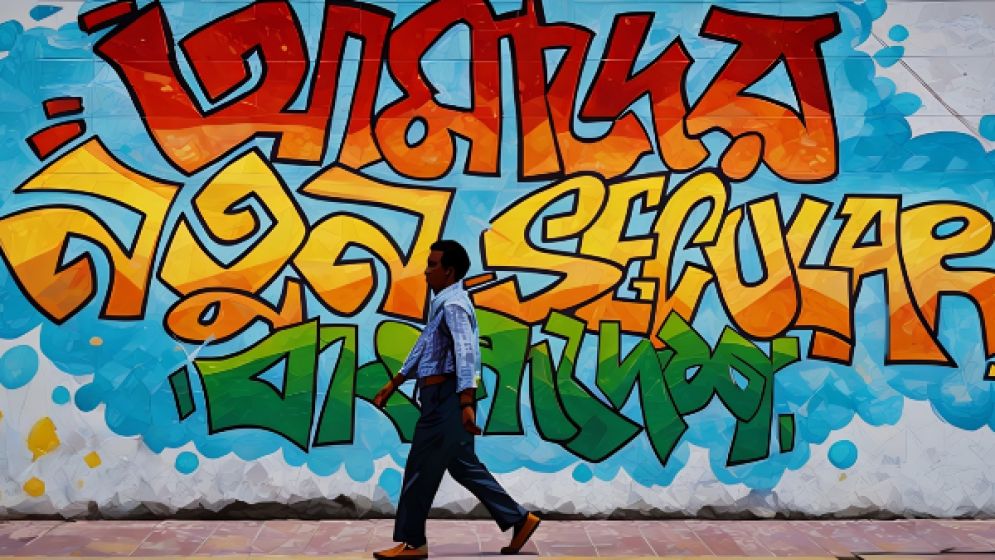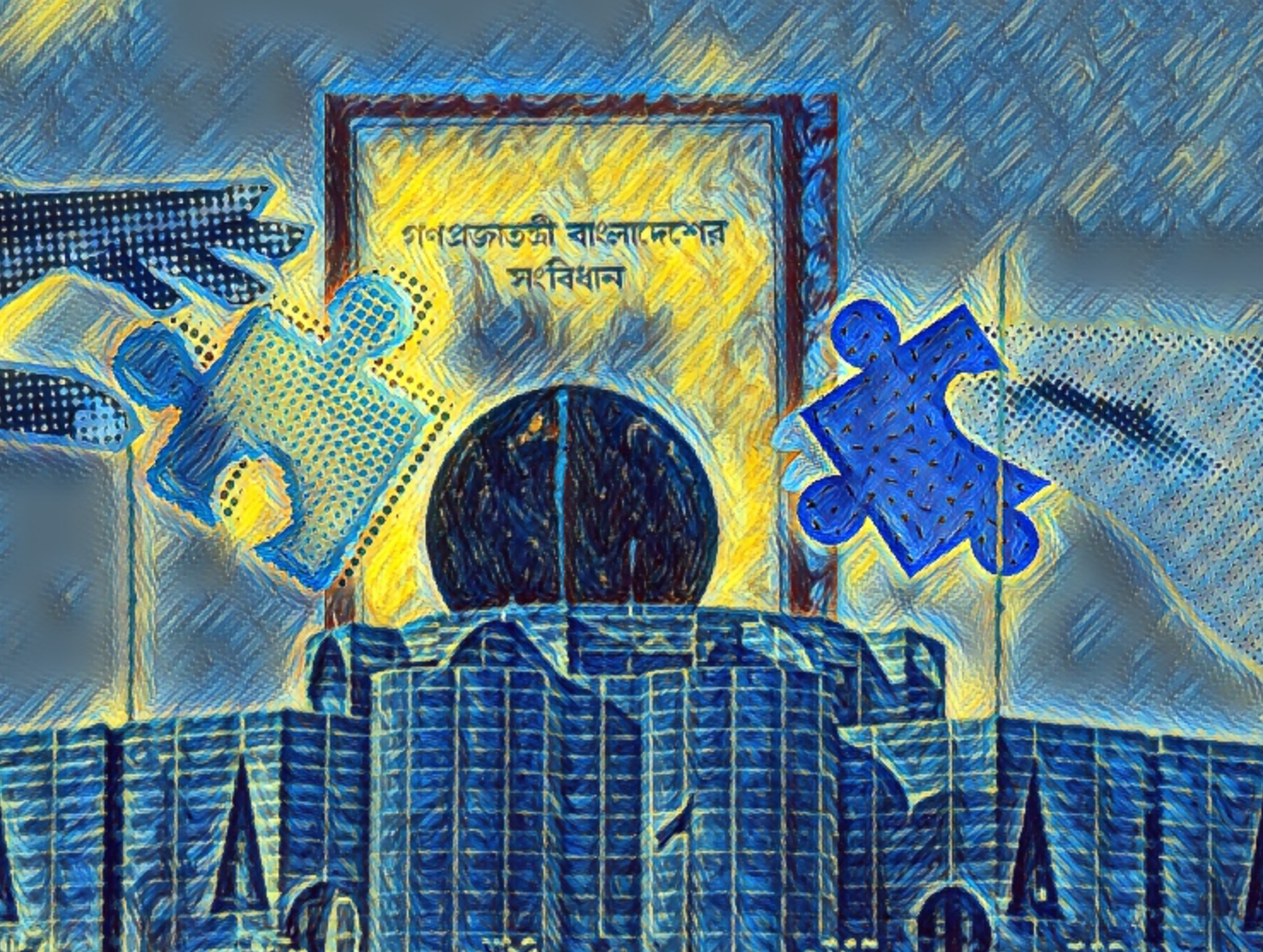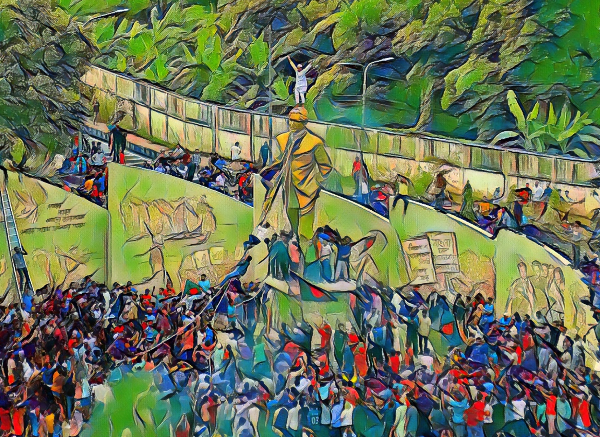Bangladesh's reform crossroads: Key questions to confront

James Novak, in his insightful book "Bangladesh: Reflection in the Water," draws a compelling parallel between politics in Bangladesh and alcohol in the West.
He argues that politics in Bangladesh transcends the mere framework of governance, permeating the social, economic, and even religious fabric of society.
This deep-rooted politicization of life, while a testament to the passionate nature of the Bangladeshi people, has also been a source of both promise and peril.
For the past 50 years, the promise of a politically engaged populace has been tragically overshadowed by the self-serving actions of many politicians.
The noble ideal of politics as a means to serve the people has been distorted, with political agendas often prioritizing personal gain and partisan interests over the needs of the nation.
This is because Bangladesh's journey has been marked by turbulence, with progress often arising from the clash between constitutional order and revolutionary impulses.
The discourse surrounding reform, increasingly intertwined with the state itself, has become a complex battleground where various stakeholders vie for influence, potentially hindering or advancing the nation's development.
A central question facing Bangladesh today is whether incremental reforms or a complete overhaul of the political landscape is the more effective path forward.
However, any successful approach must embrace both philosophical and pragmatic considerations.
It must acknowledge the deeply ingrained political consciousness of the populace while also addressing the concerns of those who may be resistant to change or stand to lose power.
Ultimately, navigating this complex terrain requires a delicate balance of idealism and realism, ensuring that any transformation serves the collective good and leads to a more just and equitable future for all Bangladeshis.
-6706395f6dbc7.png)
Addressing the fundamental questions
Before Bangladesh can embark on meaningful political reform or reinvention, it must grapple with fundamental questions that delve into the heart of its national identity and aspirations.
We must move beyond the clichés of official documents and confront the complexities of defining "the people" and their power.
This requires a critical examination of our understanding of citizenship, moving beyond general perceptions to a robust theoretical framework.
We must question how and why people should find satisfaction in the current exercise of political power. Is this satisfaction authentic, or is it a product of limited alternatives and ingrained political structures?
Are we clinging to political values inherited from the Westminster model or interpretations of Greek democracy simply due to a lack of indigenous alternatives? And how do these borrowed principles influence our social values and shape our individual sense of pride and belonging?
Ultimately, any reform or reinvention must aim to establish enduring societal orders that serve the greater good. This necessitates a deep understanding of the interplay between political structures and the social and economic realities of the people.
The political values that accompanied Bangladesh's independence in 1971, while inspired by various historical models, often overshadowed the rich tapestry of social values woven over centuries.
A nation's political system must reflect and fulfill the aspirations of its people, aspirations shaped by their intricate social and economic interactions. However, in Bangladesh, the political landscape that emerged after independence seemed to cater primarily to the interests of the middle class, neglecting the needs and voices of other segments of society.
This created a fundamental disconnect between the political system and the diverse social classes that comprise the nation, a disconnect that continues to fuel tension and hinder progress.
It is because the framing of Bangladesh's constitution, while intending to establish a democratic framework, inadvertently laid the groundwork for the very challenges the nation grapples with today.
By prioritizing the interests of the middle class and centralizing power in the hands of political leaders, the constitution marginalized the aspirations of the broader population.
Furthermore, the process sidelined the expertise of seasoned politicians with deep constitutional knowledge, further undermining its potential.

The convoluted concept of “citizenry”
This skewed approach to constitution-making fostered a political culture where personality cults eclipsed genuine political beliefs and ideology.
The focus shifted from the principles of a republic to the charisma of individual leaders, paving the way for an oppressive system where political figures could wield power akin to dictators for decades.
While the constitution granted citizens the right to vote every five years, this limited form of participation proved susceptible to manipulation, hindering genuine popular influence.
The crucial mechanism of holding political leaders accountable was thus confined to a flawed electoral process, leaving the people with little recourse to address grievances or shape policy between elections.
The very concept of "citizenry" was reduced to a collection of atomized individuals, each possessing rights and protections from the state, but with diminished emphasis on their collective responsibilities and power.
This shift towards individualism, while emphasizing personal freedom and rights, inadvertently eroded the sense of civic duty and moral responsibility towards the collective good.
Consequently, the people of Bangladesh have struggled to fully and responsibly participate in the republic or assert their legitimate claims within it.
The historical pride rooted in a rich tapestry of social and political values, carefully nurtured over centuries through customs and rituals, has been eroded.
In its place, a patron-client system emerged, dominated by a middle-class elite that has often prioritized its own interests over the needs of the nation as a whole.
As societal values shifted from an emphasis on collective well-being and social responsibility towards individual vanity and the pursuit of rapid wealth, money became the dominant force in Bangladeshi society.
The pursuit of material gain overshadowed the deeper fulfillment derived from leading a life grounded in societal obligations and ethical considerations.
This shift eroded the traditional sense of pride rooted in communal values and replaced it with a focus on power and material possessions, while a sense of shame or accountability seemed to fade from the collective consciousness.

So, how should the reforms take
place?
In this context, the debate surrounding the current government's constitutional authority to implement reforms is a critical one.
While the desire for change is understandable, it's crucial to recognize that the violent transition of power does not necessarily equate to a genuine revolution akin to those witnessed in Russia or Cuba.
Such a tumultuous change does not automatically justify extreme or radical reforms. Any attempt at reform or reinvention must be grounded in a realistic assessment of the nation's political, social, and religious landscape, while also considering the interconnectedness of global realities.
A crucial first step towards meaningful change is to integrate moral principles with the legal frameworks that govern the state.
This entails grounding the fundamental rules of society in the ethical and moral teachings found within various religious ideologies, while simultaneously employing secular laws to regulate daily societal affairs.
Furthermore, drawing inspiration from documents like the preamble of the American Constitution or the Confucian doctrines, any reforms should explicitly enshrine the people's right to remove a government that abuses its power and descends into despotism.
Kindness and justice should be the guiding principles for those in power, and the rights and limitations pertaining to life, liberty, and the pursuit of happiness should be clearly defined.
This will help transform individuals into active and responsible citizens of a republic deeply rooted in societal values, rituals, and customs.
Finally, it is essential to redefine the fundamental rights of individuals, shifting away from a purely transactional and commercial perspective.
These rights must be recognized as essential services crucial to upholding the dignity of all citizens and fostering a just and equitable society.
—-
Brigadier General (Retd) AF Jaglul Ahmed, ndc, psc, Phd is a regular contributor in national daily’s

